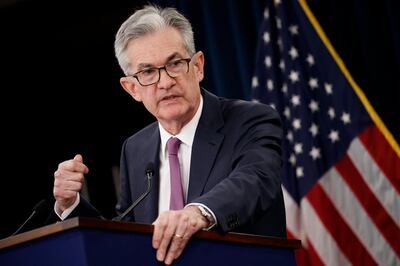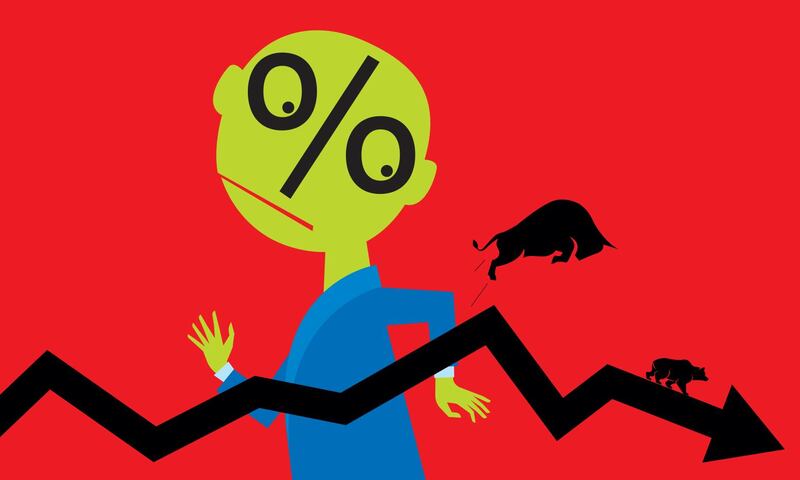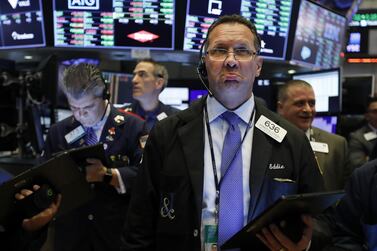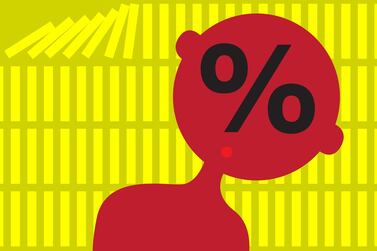This was supposed to be the year interest rates finally started to touch normal levels again, but it isn't turning out that way.
The mood has changed dramatically since December, when the US Federal Reserve increased rates for the sixth time since 2015 and warned markets to expect at least another two hikes this year.
With US growth and inflation slowing, rate expectations have now gone sharply into reverse.
The Fed voted nine to one to hold benchmark rates at a target range of 2.25 per cent to 2.5 per cent on Thursday, but chairman Jerome Powell said in a press conference afterwards that some officials believe the case for accommodation has "strengthened", and markets now expect a cut in July and possibly in September too.

If the Fed does cut it will boost stock and property markets, while hitting returns on cash and driving down the value of the US dollar and with it, the UAE dirham.
This means your local earnings may not travel as far next time you send them overseas. So will you be a winner from lower rates, or one of the losers?
Chris Beauchamp, chief market analyst at online trading platform IG, notes that the Fed is not the only central bank taking a dovish stance. Eurozone rates currently stand at zero and last week European Central Bank president Mario Draghi, left the door open to negative rates and quantitative easing (QE) to kick-start the sluggish European economy. “One dovish central bank in a week is perhaps an outlier, two is a trend.”
President Donald Trump has even accused the ECB of currency manipulation by "making it unfairly easier for them to compete against the USA”. He has been putting the Fed under pressure to cut rates by a full percentage point.
John Hardy, head of FX Strategy at Saxo Bank, says the Fed has been forced to reverse monetary policy because its “aggressive rate hike regime” has hit financial stability and left the US dollar overvalued.
Gaurav Kashyap, head of futures at EGM in Dubai, cautions against expecting a sharp drop in the US dollar. “No other country is in a rush to hike rates. Australia and Canada have both cut, UK rates are frozen at 0.75 per cent and won't rise until Brexit is fixed, and the eurozone is also dovish.”
Mr Hardy, however, says it is "likely that we are headed back towards effective zero rates in the US and eventually Quantitative Easing if the economy is tilting into recession as we believe it is".
So far, this has been good news for stock markets but Mr Hardy warns it may not last. “If the US and global economy continue to show signs of weakness, it is hard to believe the bull market will continue, although we may see brief new highs over the summer," he adds.
Low interest rates and QE may pump up asset prices but do not fix underlying structural problems. They also compound the long-term problem by diverting investment into unproductive assets, Mr Hardy says. If they are not enough, central bankers may be forced to adopt more extreme stimulus measures he adds.
Maged Villegas Hassanain, a financial adviser living in Abu Dhabi, says cheap money could temporarily revive stock markets but agrees the impact may not last long. “Investors may be wiser to buy the subsequent cool-off period which could last for 12 to 18 months.”
Jahangir Aka, managing director, MEA, at fund manager Neuberger Berman in Dubai, says modest interest rate cuts may create a soft economic landing as the US, Europe and China are all slowing. “This would be welcome news for the region’s economy and businesses.”
Iyad Abu Hweij, managing director of Allied Investment Partners PJSC in Dubai, says a cut in July would boost the UAE. “It would make borrowing cheaper for investors, induce investments from neighbouring regions, and revitalise the tourism sector.”
He says fixed-interest investments such as government and corporate bonds should rise in value as look more attractive when interest rates are falling. Investors who hold bond funds in their portfolios therefore have some protection against future stock market volatility.
A Fed rate cut will raise some awkward questions over whether it has bowed to public pressure from Mr Trump to act, Mr Hweij adds.
It also suggests that monetary policy has also been ineffective, as the global economy is clearly in no state to withstand more expensive money.
Fawad Razaqzada, technical analyst at currency specialists Forex.com, says when investors realise why central banks are cutting interest rates, jubilation could turn to despair. “Rates are being cut because the global economy is slowing down amid the escalation of geopolitical risks. With rates already so low, how much of a boost will the economy get anyway?”
How falling rates will affect savers and borrowers:
• Borrowing
Ambareen Musa, founder of UAE comparison platform Souqalmal.com, says lower interest rates can incentivise borrowing and spur economic growth in the UAE. “The most notable impact would be on mortgage borrowing. Lower mortgage interest rates will make mortgages more attractive for potential homebuyers and ease the burden on existing borrowers.”
This will encourage more people to refinance existing home loans. “You can do this to lower your monthly payments, tap into the equity in your home, or shorten your mortgage term so that you take full ownership of your property sooner and pay less interest as a result.”
With interest rates now more likely to fall and rise, taking out a variable rate mortgage can make more sense than fixing, she adds.
Ms Musa says lower mortgage rates may also tempt buyers back into the UAE housing market, and there are now great deals available on both off-plan and completed properties. “This could be just the stimulus required to invigorate the property market and the economy.”
Mr Hassanain says UAE expats and residents who are thinking of borrowing money to buy a property should consider waiting a little longer, as they may be able to secure cheaper financing in the months ahead.
• Savings
Lower interest rates inevitably spell further bad news for savers, Ms Musa says. “That is a shame as we were just beginning to see some interesting high-yield savings, deposit and hybrid accounts, but an interest rate cut will dull their shine.”
Lower interest rates could also make it harder to protect your savings from inflation, although with Dubai consumer prices falling 2.61 per cent in the year to May, this may be less of a concern at the moment.
• Gold
The gold price has benefit from falling rates. The precious metal does not pay interest, so struggles when savers can get a higher return on cash.
Ned Naylor-Leyland, manager of the Merian Gold & Silver Fund, says we are now witnessing a genuine structural shift in monetary policy. “The past seven years of hawkish promises about higher rates and central bank balance sheet unwinding was a blip in the trend of monetary policy that is loose, looser and looser still.”
As safe haven currency the US dollar looks set to weaken, money is rushing into precious metals as a store of value. “Gold and silver prices now look set to resume their bull run,” he adds.
The gold price is up 5.57 per cent in the last 30 days to $1,390 at time of writing.
• Cryptocurrencies
Many also see Bitcoin as a store of value too and this may partly explain why its price has now topped $10,000. After plunging in 2018, the crypto-currency has shot up this year, almost tripling in value from $3,750 in January to $10,735 at time of writing, a 15-month high.
As ever, explanations for the latest movement are shadowy at best, although some say that Facebook’s proposed crypto-currency Libra has given the market fresh credibility.
Gary McFarlane, crypto-currency analyst at UK investment platform Interactive Investor, says Bitcoin is far from realising its original vision of being “digital cash” for payments but is now being used as a store of value. "The digital gold thesis is gaining traction as asset managers such as Fidelity set up custody services for financial institutions and high net worth individuals.”
Its popularity could be driven by an economic crisis or weakening faith in mainstream currencies. People in countries with severe economic problems including Venezuela, Argentina and Zimbabwe have stashed money away in Bitcoin, as have Chinese investors amid rumours that the government will take measures to prevent capital flight.
However, Bitcoin and cryptos remain highly volatile, so keep a cool head and do not invest money you cannot afford to lose.








